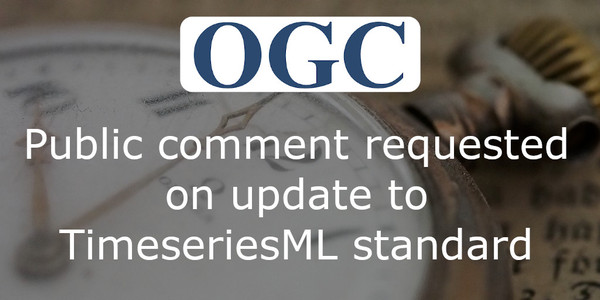TimeseriesML allows for the precise representation of a sequence of data values that are ordered in time – and now supports changing periodicity.

The Open Geospatial Consortium (OGC) seeks public comment on version 1.3 of the TimeseriesML standard. TimeseriesML is an XML Encoding of the Timeseries Profile of Observations and Measurements, and is used for the representation of observations as ‘timeseries' – that is, a sequence of data values that are ordered in time. TimeseriesML supports observations tagged with location, but is equally useful for applications that aren't concerned with location.
The core aspect of the Timeseries Profile of Observations and Measurements is the correct, precise description of timeseries. The intent of TimeseriesML is to enable the exchange of precise timeseries datasets across information systems.
Through the use of existing OGC standards, TimeseriesML provides an interoperable exchange format that may be re-used to address a range of data exchange requirements and scenarios. Example areas of usage are: cross-border exchange of observational and/or forecast data; release of data for public dissemination; enhancing disaster management through data exchange; and exchange in support of national reporting.
Version 1.3 of TimeseriesML adds an optional ‘TimeseriesMetadata' property as a specific count of the number of time steps in a timeseries, or each homogeneous (regularly spaced) segment of an irregularly spaced whole timeseries. For example, a timeseries containing temperature forecasts:
- every 1 hour for the 1st 36 hours of the time series;
- every 3 hours from forecast hour 36 to 72; and
- every 6 hours from forecast hour 72 out to 7 days.
The candidate TimeseriesML v1.3 standard is available for review and comment on the OGC Portal. The downloadable archive contains the Candidate Standard as well as supporting information concerning the revision, including release notes and a presentation outlining in detail the changes. Comments are due by the 19th of March, 2020, and should be submitted via the method outlined on the TimeseriesML v1.3 candidate standard's public comment request page.
About OGC
The Open Geospatial Consortium (OGC) is an international consortium of more than 530 businesses, government agencies, research organizations, and universities driven to make geospatial (location) information and services FAIR – Findable, Accessible, Interoperable, and Reusable.
OGC's member-driven consensus process creates royalty free, publicly available geospatial standards. Existing at the cutting edge, OGC actively analyzes and anticipates emerging tech trends, and runs an agile, collaborative Research and Development (R&D) lab that builds and tests innovative prototype solutions to members' use cases.
OGC members together form a global forum of experts and communities that use location to connect people with technology and improve decision-making at all levels. OGC is committed to creating a sustainable future for us, our children, and future generations.
Visit ogc.org for more info on our work.
“
